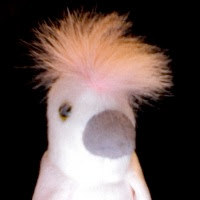Yesterday I described the creative artist's equivalent of being stuck in a one-way cul-de-sac. When your goals are so big that you can't believe you can achieve them, but lesser goals seem too insignificant to bother pursuing, then you have no way to move forward. It's a trap that many artists wander into, and once there, you can feel very, very stuck.
But remember, as I explained just a few days ago, although the condition of being stuck is very real and nothing to joke about, it nonetheless is not a physical trap. It's a mental trap. And sometimes it's possible to think your way free.
To start with, you might ask yourself: How did an impossibly-big goal become the only goal that I'm willing to think about?
Or, you could be blunt about it, and ask yourself: What am I trying to prove? And who am I trying to prove it to?
Are you asking your creative process to carry the burden of problems from your financial life, your social life, your troubled relationships, wounds from your childhood? Are you asking your creative output to redeem yourself, to prove your worthiness, to make up for past sins or errors?
If so, that might be more than your muse can handle. Who wouldn't freeze up under that kind of pressure?
The point is, if you let these external concerns govern your creative life, then it can cause a kind of ambition inflation, where only huge and heroic projects seem worthwhile, and only over-the-top, best-in-the-world results seem adequate.
Do what you have to do to disentangle your creative process from these pressures. If necessary, swear off for a few months any goal that sounds even faintly ambitious or impressive, and let your muse just have some fun with absurd and whimsical goals. Write some short songs about snails and other small, lowly animals. Write fanciful essays about random objects found on the roadside. Draw sketches of office supplies and electronics accessories.
And this would be the perfect time to get Julia Cameron's terrific book, The Artist's Way. Her book is a 12-week course designed to heal and strengthen your relationship with what she calls your inner artist, which I call your muse.
Now, I feel I have to mention, as an aside, that there's nothing wrong with trying to prove something — if you do it in a way that doesn't break your creative process. Instead of letting that impulse distort your planning process and steer you towards bigger and grander goals, bring in into the studio and let it goad you into doing better and stronger work.
And there's nothing wrong with bringing your social woes, your relationship problems, your childhood wounds, and all the darkness of your soul into the studio as raw material. The magical alchemy of the creative process can transform all of that dark stuff into works of transcendent beauty and set you free of the past. The trick is to bring that stuff inside the creative process as fertile material instead of letting it sit on top of the process like some kind of taskmaster.
Subscribe to:
Post Comments (Atom)


No comments:
Post a Comment